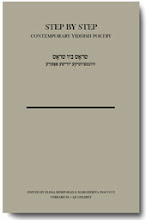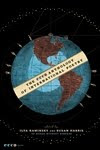News on the Muse
There's a worthwhile poem by C.K. Williams in the current issue of The New Yorker. It's called "Doves"; it owes something to, and I think improves upon, the Phillip Larkin poem The Winter Palace. (It's a pity that the New Yorker doesn't see fit to excerpt its poetry selections on its Web site.)
There's some good stuff in the current issue of the Black Warrior Review. I particularly like the interviews called "Lives of the Poets". That said, I wish I were better able to appreciate the current popularity of McSweeney'sese, especially in the interview genre: nothing can be asked except with whimsy, nothing can be phrased except nonchalantly. Rank seriousness is to be avoided, perhaps because it is confused with bombast, cliche, or arrogance.
One of those interviewed is the poetry phenom Aimee Nezhukumatathil. She's younger than I am, but has published two more books of poetry than I have (i.e. two). Primed with this jealousy, I looked her up on-line, but found her poems to be worthy only of admiration and envy, not of bitter critique. Alas!
I'm sending off another manuscript this week to the Pathetically Hopeful Poets' Contest. (Not its real name.)
10/29/03
Apologia pro bloga sua, or: The jealousy of scribes increaseth wisdom
In the past week, while I was on vacation, Baraita posted several times on matters sublime and ridiculous. She also linked to (and mentioned) this blog; this generous mention has lit a leaping fire under the Readership Engine. Of course, this increases the pressure to write things that are actually worth reading. On this evening of re-entry, I hate to disappoint those who have come here expecting a quirky novella or two, but the only world-shaking and –remaking thing I have to share is this:
If you find yourself in Elkins, West Virginia, and have need of a vanilla milkshake, please go directly to Scottie’s of Elkins, at 430 Randolph Avenue (across the street from a smugly multicolored Safeway). Theirs is damn fine. (I know the ice cream wasn’t hechshered, but if one can’t fall off the wagon on vacation, then when can one?) From the placemats it appears that the diner is named after a dog. We also learned that the kind and helpful woman who waited on us (in between her end-of-day wiping down and polishing of various parts of the diner) works a 14-hour day, from 6 am to 8 pm, and will continue doing so until she puts her boy through college.
Actually, as long as I’m writing, I do have something else to mention about our West Virginia vacation. (There were so many points of beauty about it, from the old-time fiddlers’ convention we happened to be within Shabbes distance of, to the gaily yet somberly changing leaves, that I could go on for hours. I hope to touch on some of these other points in my Yiddish blog, too.) When I was in West Virginia with my wife, I was reminded yet again of how much I love churches.
This is not by any means the reaction a traditional Jew is supposed to have, for historical and theological reasons. However, I find both of these insufficient determinants of my present behavior. The Church – yes, the Church, but its present-day adherents, not to mention the Protestants of various hues (and especially those Americans of both sorts!), are not generally hostile to me or my people. Theologically speaking, it’s clear from the opening pitch of Avodah Zarah 2b (leaving Tosfos aside for a moment) that the Rabbis saw Christianity as idolatry. Well, as a rabbi friend said to me once, you either agree or you don’t. I don’t. (There are many instances of this, when the reasonably learned liberal Jew needs to decide whether he agrees with the presuppositions of Chazal – or, more precisely, whether those presuppositions are necessary for a morally halachic Judaism.) I won’t go into the details here, but I don’t think the trinity is a species of shituf (belief that the world was created by more than one god in partnership) any more than the sefiros are.
Back to the churches. Not only did we happen upon the Smallest Church in the 48 States*, but nearly every town we passed through in West Virginia, not to mention the rural roads we trundled down, was dotted by different flavors of Christian worship-house: Episcopalian, Baptist, Methodist, Presbyterian, the odd Catholic church, and several examples of what are confusingly called “Church of God.” (As opposed to?) Such variety put me in mind of something that never was and never will be: the interdenominational shtetl, where shuls of every leaning and nusekh happily co-exist, and the Lord’s Day is Saturday.
*This claim may be questionable. Other contenders, some much more plausible, are listed here.
In the past week, while I was on vacation, Baraita posted several times on matters sublime and ridiculous. She also linked to (and mentioned) this blog; this generous mention has lit a leaping fire under the Readership Engine. Of course, this increases the pressure to write things that are actually worth reading. On this evening of re-entry, I hate to disappoint those who have come here expecting a quirky novella or two, but the only world-shaking and –remaking thing I have to share is this:
If you find yourself in Elkins, West Virginia, and have need of a vanilla milkshake, please go directly to Scottie’s of Elkins, at 430 Randolph Avenue (across the street from a smugly multicolored Safeway). Theirs is damn fine. (I know the ice cream wasn’t hechshered, but if one can’t fall off the wagon on vacation, then when can one?) From the placemats it appears that the diner is named after a dog. We also learned that the kind and helpful woman who waited on us (in between her end-of-day wiping down and polishing of various parts of the diner) works a 14-hour day, from 6 am to 8 pm, and will continue doing so until she puts her boy through college.
Actually, as long as I’m writing, I do have something else to mention about our West Virginia vacation. (There were so many points of beauty about it, from the old-time fiddlers’ convention we happened to be within Shabbes distance of, to the gaily yet somberly changing leaves, that I could go on for hours. I hope to touch on some of these other points in my Yiddish blog, too.) When I was in West Virginia with my wife, I was reminded yet again of how much I love churches.
This is not by any means the reaction a traditional Jew is supposed to have, for historical and theological reasons. However, I find both of these insufficient determinants of my present behavior. The Church – yes, the Church, but its present-day adherents, not to mention the Protestants of various hues (and especially those Americans of both sorts!), are not generally hostile to me or my people. Theologically speaking, it’s clear from the opening pitch of Avodah Zarah 2b (leaving Tosfos aside for a moment) that the Rabbis saw Christianity as idolatry. Well, as a rabbi friend said to me once, you either agree or you don’t. I don’t. (There are many instances of this, when the reasonably learned liberal Jew needs to decide whether he agrees with the presuppositions of Chazal – or, more precisely, whether those presuppositions are necessary for a morally halachic Judaism.) I won’t go into the details here, but I don’t think the trinity is a species of shituf (belief that the world was created by more than one god in partnership) any more than the sefiros are.
Back to the churches. Not only did we happen upon the Smallest Church in the 48 States*, but nearly every town we passed through in West Virginia, not to mention the rural roads we trundled down, was dotted by different flavors of Christian worship-house: Episcopalian, Baptist, Methodist, Presbyterian, the odd Catholic church, and several examples of what are confusingly called “Church of God.” (As opposed to?) Such variety put me in mind of something that never was and never will be: the interdenominational shtetl, where shuls of every leaning and nusekh happily co-exist, and the Lord’s Day is Saturday.
*This claim may be questionable. Other contenders, some much more plausible, are listed here.
10/22/03
Attempted transcendence
Abraham Sutzkever's 90th-birthday celebration at YIVO
A prophet is apart from his people, yet a part of it: his remonstrations are centered on his audience's present-day concerns. Abraham Sutzkever, whose 90th birthday was marked last night at YIVO, is a prophetic poet of a different variety. While his contemporaries in 1930s Vilna saw poetry as an immanent art, anchored in the conditions of their time, Sutzkever strove to forge a transcendental poetry, which would protect (as one of his poems has it) even the snowman from melting.
While Sutzkever was both a victim and a participant, from his earliest youth to his formative middle age, of most major Jewish historical transitions of the twentieth century (the First World War, the Vilna Ghetto, the successes and final tragedy of Soviet Yiddish literature, the trial at Nuremberg, the creation and birth pangs of the State of Israel, victory in the Six Day War), he never saw himself as a "hardship case" (as Ruth Wisse of Harvard, the evening's main speaker, phrased it) -- rather, he has always sought to crystallize the Jew's history-challenging mission. As Wisse has it, "Materialists like Theodor Adorno have suggested that Auschwitz destroys the faith on which great poetry depends. This does not tell us anything about poetry after Auschwitz. It only tells us why the materialists have not written great poetry. Sutzkever's faith in poetry was no more subject to German power than Rabbi Akiva's faith in God was subject to Roman power, and it seems certain that his defiance of death derived from the apprehension of God's immortality. Defying the odds is the condition of being a Jew. Sutzkever also made it the condition of being a great poet."
Abraham Sutzkever's 90th-birthday celebration at YIVO
A prophet is apart from his people, yet a part of it: his remonstrations are centered on his audience's present-day concerns. Abraham Sutzkever, whose 90th birthday was marked last night at YIVO, is a prophetic poet of a different variety. While his contemporaries in 1930s Vilna saw poetry as an immanent art, anchored in the conditions of their time, Sutzkever strove to forge a transcendental poetry, which would protect (as one of his poems has it) even the snowman from melting.
While Sutzkever was both a victim and a participant, from his earliest youth to his formative middle age, of most major Jewish historical transitions of the twentieth century (the First World War, the Vilna Ghetto, the successes and final tragedy of Soviet Yiddish literature, the trial at Nuremberg, the creation and birth pangs of the State of Israel, victory in the Six Day War), he never saw himself as a "hardship case" (as Ruth Wisse of Harvard, the evening's main speaker, phrased it) -- rather, he has always sought to crystallize the Jew's history-challenging mission. As Wisse has it, "Materialists like Theodor Adorno have suggested that Auschwitz destroys the faith on which great poetry depends. This does not tell us anything about poetry after Auschwitz. It only tells us why the materialists have not written great poetry. Sutzkever's faith in poetry was no more subject to German power than Rabbi Akiva's faith in God was subject to Roman power, and it seems certain that his defiance of death derived from the apprehension of God's immortality. Defying the odds is the condition of being a Jew. Sutzkever also made it the condition of being a great poet."
Labels:
Avrom Sutzkever,
poetry,
Yiddish literature
10/21/03
Clearing away the miasma
Speaking of miasmas, and attempts to clear them away, there's a relevant article in the recent issue of the American Journal of Epidemiology. Don't be scared, layfolk: though the prose is flatfooted and just plain incoherent in spots, the point is well argued -- namely, rather than squabbling over which Big Variable is to blame for a given disease entity, it'd be much more productive to consider the web of interacting variables.
(By the way, hostility gets top billing in the article because it's a commentary on a recent study devoted to that topic.)
Invited Commentary: Socioeconomic Status, Hostility, and Health Behaviors--Does It Matter Which Comes First?
Speaking of miasmas, and attempts to clear them away, there's a relevant article in the recent issue of the American Journal of Epidemiology. Don't be scared, layfolk: though the prose is flatfooted and just plain incoherent in spots, the point is well argued -- namely, rather than squabbling over which Big Variable is to blame for a given disease entity, it'd be much more productive to consider the web of interacting variables.
(By the way, hostility gets top billing in the article because it's a commentary on a recent study devoted to that topic.)
Invited Commentary: Socioeconomic Status, Hostility, and Health Behaviors--Does It Matter Which Comes First?
10/14/03
Ghetto miasmas, and other apologias.
In her long article in the New York Times Magazine of this past Sunday, Helen Epstein patches together fuzzy, ill-considered statements of her own, together with unquantified and unsupported assertions by some epidemiologsts who should know better, into a strange claim that's sufficiently summed up by the following paragraph (the piece's conclusion):
Whatever the miasma is that afflicts America's minority poor, it is at least partly a legacy of the segregation of America's cities. These neighborhoods, by concentrating the poor, also concentrate the mysterious, as yet poorly understood, factors that make them sick. You'd almost think this new miasma was caused by some sort of infection, because of the way it seems to strike certain neighborhoods and certain types of people. I recently came across a research article by Angus Deaton of Princeton University, reporting that white people who live in cities with large black populations have higher death rates than whites with the same income who live in cities with smaller black populations. It made me wonder whether the deprived, polluted, roach-infested, stressful conditions in which poor blacks live aren't affecting all of us, to some degree. And even if we never find out what the miasma is, this possibility should scare us into treating this as the health emergency it is -- if nothing else will.
What Epstein calls a miasma (the use of such a term is a return to the days before germ theory -- in other words, an abject rhetorical surrender) is what epidemiologists and public health researchers routinely deal with in a variety of other situations: a confusing multiplicity of factors that influence disease. But these factors themselves, with all due respect to Epstein, are by no means "mysterious." Rather, these are the most common and deleterious of behaviors, smoking, drinking, and unhealthy diet, coupled with the those factors most common to poor (and often black) neighborhoods: lack of access to medical care, deteriorating buildings and infrastructure, and unsafe and unattractive neighborhoods. There is no reason why addressing these factors, together with the individual, societal, and governmental choices that make them possible, shouldn't lead us to a better understanding of why black people are sicker than white people. It is true, as Epstein points out, that our current understanding of the interaction of these factors cannot fully explain why black people are sicker than white people. Nevertheless, we need not have recourse to ill-defined psychological mechanisms in order to find the true explanation: we need only continue to study those concrete mechanisms of poverty and illness already familiar to us and well-defined in the literature.
It's curious that what Epstein calls the miasma seems to lose its miasmic nature the minute one crosses the boundaries of the poor neighborhoods in question. That is to say, causal relationships as we generally understand them are to be recognized (according to this account) when applied to actors other than the sick people themselves: for example, no one thinks that the various immoral, stupid, or ill-advised actions of various governments, those that have contributed to these health inequalities, are "mysterious" or "poorly understood." But the minute we start talking about what individual health decisions sick people might make that contribute to their illness (whether it be smoking, drinking, or diet), Epstein looses the bonds of ordinary causality and directs a miasma to be blown onto the scene.
I fear that Epstein is mistaking ordinary scientific confusion, which is attendant on any state of affairs of moderate complexity which scientists try to clarify, for a bona-fide health care mystery that she over-dramatically terms a miasma. It is far more likely that these health inequalities can be explained by a coincidence which is to our grief not at all mysterious: racism's consequences, poverty, lack of education, and the harmful mistakes real people make when leading their lives.
In her long article in the New York Times Magazine of this past Sunday, Helen Epstein patches together fuzzy, ill-considered statements of her own, together with unquantified and unsupported assertions by some epidemiologsts who should know better, into a strange claim that's sufficiently summed up by the following paragraph (the piece's conclusion):
Whatever the miasma is that afflicts America's minority poor, it is at least partly a legacy of the segregation of America's cities. These neighborhoods, by concentrating the poor, also concentrate the mysterious, as yet poorly understood, factors that make them sick. You'd almost think this new miasma was caused by some sort of infection, because of the way it seems to strike certain neighborhoods and certain types of people. I recently came across a research article by Angus Deaton of Princeton University, reporting that white people who live in cities with large black populations have higher death rates than whites with the same income who live in cities with smaller black populations. It made me wonder whether the deprived, polluted, roach-infested, stressful conditions in which poor blacks live aren't affecting all of us, to some degree. And even if we never find out what the miasma is, this possibility should scare us into treating this as the health emergency it is -- if nothing else will.
What Epstein calls a miasma (the use of such a term is a return to the days before germ theory -- in other words, an abject rhetorical surrender) is what epidemiologists and public health researchers routinely deal with in a variety of other situations: a confusing multiplicity of factors that influence disease. But these factors themselves, with all due respect to Epstein, are by no means "mysterious." Rather, these are the most common and deleterious of behaviors, smoking, drinking, and unhealthy diet, coupled with the those factors most common to poor (and often black) neighborhoods: lack of access to medical care, deteriorating buildings and infrastructure, and unsafe and unattractive neighborhoods. There is no reason why addressing these factors, together with the individual, societal, and governmental choices that make them possible, shouldn't lead us to a better understanding of why black people are sicker than white people. It is true, as Epstein points out, that our current understanding of the interaction of these factors cannot fully explain why black people are sicker than white people. Nevertheless, we need not have recourse to ill-defined psychological mechanisms in order to find the true explanation: we need only continue to study those concrete mechanisms of poverty and illness already familiar to us and well-defined in the literature.
It's curious that what Epstein calls the miasma seems to lose its miasmic nature the minute one crosses the boundaries of the poor neighborhoods in question. That is to say, causal relationships as we generally understand them are to be recognized (according to this account) when applied to actors other than the sick people themselves: for example, no one thinks that the various immoral, stupid, or ill-advised actions of various governments, those that have contributed to these health inequalities, are "mysterious" or "poorly understood." But the minute we start talking about what individual health decisions sick people might make that contribute to their illness (whether it be smoking, drinking, or diet), Epstein looses the bonds of ordinary causality and directs a miasma to be blown onto the scene.
I fear that Epstein is mistaking ordinary scientific confusion, which is attendant on any state of affairs of moderate complexity which scientists try to clarify, for a bona-fide health care mystery that she over-dramatically terms a miasma. It is far more likely that these health inequalities can be explained by a coincidence which is to our grief not at all mysterious: racism's consequences, poverty, lack of education, and the harmful mistakes real people make when leading their lives.
10/13/03
from The Temple (1633), by George Herbert:
Sion.
Lord, with what glorie wast thou serv’d of old,
When Solomons temple stood and flourished!
Where most things were of purest gold;
The wood was all embellished
With flowers and carvings, mysticall and rare:
All show’d the builders, crav’d the seers care.
Yet all this glorie, all this pomp and state
Did not affect thee much, was not thy aim;
Something there was, that sow’d debate:
Wherefore thou quitt’st thy ancient claim:
And now thy Architecture meets with sinne;
For all thy frame and fabrick is within.
There thou art struggling with a peevish heart,
Which sometimes crosseth thee, thou sometimes it:
The fight is hard on either part.
Great God doth fight, he doth submit.
All Solomons sea of brasse and world of stone
Is not so deare to thee as one good grone.
And truly brasse and stones are heavie things,
Tombes for the dead, not temples fit for thee:
But grones are quick, and full of wings,
And all their motions upward be;
And ever as they mount, like larks they sing;
The note is sad, yet musick for a King.
Sion.
Lord, with what glorie wast thou serv’d of old,
When Solomons temple stood and flourished!
Where most things were of purest gold;
The wood was all embellished
With flowers and carvings, mysticall and rare:
All show’d the builders, crav’d the seers care.
Yet all this glorie, all this pomp and state
Did not affect thee much, was not thy aim;
Something there was, that sow’d debate:
Wherefore thou quitt’st thy ancient claim:
And now thy Architecture meets with sinne;
For all thy frame and fabrick is within.
There thou art struggling with a peevish heart,
Which sometimes crosseth thee, thou sometimes it:
The fight is hard on either part.
Great God doth fight, he doth submit.
All Solomons sea of brasse and world of stone
Is not so deare to thee as one good grone.
And truly brasse and stones are heavie things,
Tombes for the dead, not temples fit for thee:
But grones are quick, and full of wings,
And all their motions upward be;
And ever as they mount, like larks they sing;
The note is sad, yet musick for a King.
Subscribe to:
Posts (Atom)








